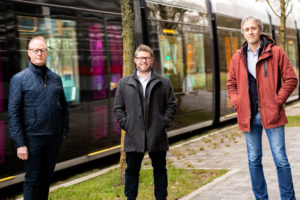Late payments have a way of rippling across an economy: a temporary lull in patronage at a cafe leads to a pile of bills and choices to be made about which ones get paid first. The losers of that choice, whether point-of-sale software providers, landlords or wholesale suppliers, are then left with their own cash shortage as they wait for the café to cover its debt. This ripple keeps moving, upwards and outwards across the supply chains that make up the heart of Europe’s economy.

Due to their limited borrowing power, the businesses most affected by these ripples are the small and medium-sized enterprises (SMEs) that account for 56% of the European economy — a fact that has been perhaps most keenly felt during the COVID-19 crisis. For SMEs, the pandemic has quickly proved to be as desperate as any financial crisis in recent memory, sweeping across the continent and forcing many to close their doors, limit their capacity or wrestle with a growing pile of unpaid invoices.
The challenges SMEs face today are extreme, but they aren’t exactly new. In fact, since the financial crisis of 2008, SMEs have struggled with gaining access to the credit that both private individuals and larger corporations so easily acquire to help bridge the gap between paychecks. New regulations about the total risk a bank is allowed to carry are partly to blame, but so is the fact that the administrative cost for a bank issuing a 100,000 € loan is exactly the same as for a 1,000,000 € loan. The simple truth is this: for many banks, the risk and the reward for issuing credit to SMEs just don’t add up. But here in Luxembourg, a new FinTech startup, Yoba, is set on showing the world that supporting Europe’s SMEs can pay off.
"Yoba’s vision is compelling and our research could help more SMEs to sustain their business, which is exciting as it means our work will have a direct impact on the day-to-day lives of many people."
Prof. Mats Brorsson, SnT Tweet

Through their research collaboration, SnT and Yoba will explore which data sources — both traditional and alternative — could be harnassed most effectively to execute these automated credit checks in select European markets. They will also investigate which technologies, whether Natural Language Processing, Machine Learning, or data modelling, are best suited for their purpose. In the end, the team aims to identify the optimal method for automatically creating reliable credit ratings. “Working on industrial projects such as this pushes our research further, as it gives us access to the real-world testing and data we need,” said Prof. Mats Brorsson, SnT’s principal investigator on the project.
"One of the most frustrating things for entrepreneurs to experience is negative credit decisions, after months awaiting an answer."
Atte Suominen, CEO of Yoba Tweet

“The current way of working is not sustainable,” says Suominen. “We can see companies, especially now during Covid-19 times, struggling with access to working capital financing, even despite initiatives to solve this challenge, such as Government guarantees that are meant to create easier access to working capital for SMEs. We want to do more than another stop-gap measure. We want to address the root cause of the problem: the processes and assessment methods that get in the way”.